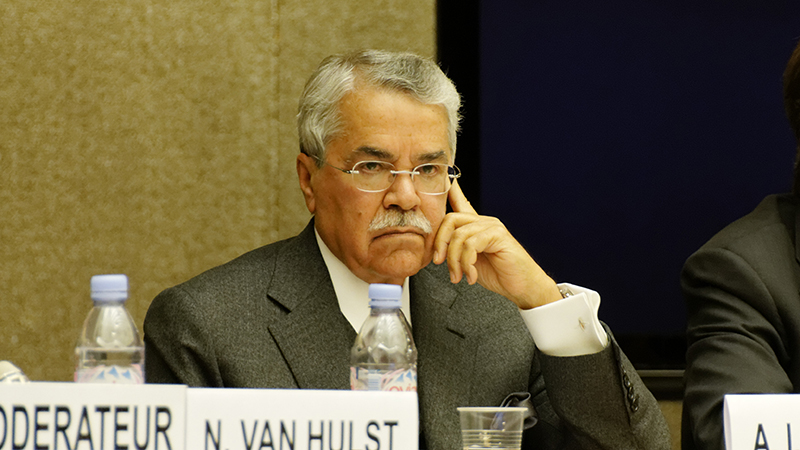After the post-Paris celebrations and backslapping, global climate change negotiations will start again on 16 May in Bonn, as countries try and work out what the 2015 UN agreement really means.
Representatives from small island states and least developed countries arrive in the former West German capital to talk tactics this week.
A plan for the talks – written by officials from France and Morocco – underlines the need for progress on climate finance and clean technology sharing before 2020.
Countries will also need to work out how a proposed 2018 global stocktake will work. Few envoys Climate Home has spoken to have a clear idea how this will work.
Farewell Al-Naimi
One face who’s unlikely to be in Bonn is Ali Al-Naimi, who was relieved of his role as Saudi Arabia’s oil chief over the weekend.
Al-Naimi was a familiar face at climate talks, where he led Riyadh’s delegation, and in recent years showed signs the Kingdom would take climate change seriously (see Climate Home i/v here).
According to Bloomberg, he plans to devote more of his time to his role at the country’s science and technology university, exploring post-oil pathways.
Khalid Al-Falih, chair of Saudi Aramco and a confidante of King Salman and Prince Mohammed replaces Al-Naimi.
New low for oil discoveries
The once-influential Al-Naimi leaves some legacy – notably a glut of oil on global markets and low oil prices. But there’s a knock-on… companies don’t have enough cash to invest in new exploration.
Discoveries of new oil have fallen to a 60-year low, according to consultants at IHS. This could lead to a shortfall in supply of 4.5 million barrels a day by 2035, says Wood McKenzie, another consultancy. More on this from the FT ($).
This week’s hot ticket
-Paris think tank IDDRI hosts a who’s-who of climate politics this week, focused on how to implement the Paris Agreement and Sustainable Development Goals. Speakers include UNEP’s incoming head Erik Solheim, IPCC chair Hoesung Lee and France climate ambassador Laurence Tubiana. Ed King will be there for Climate Home.
Flying low
How ambitious will a proposed aviation emissions deal really be? We may understand more after talks at the UN’s International Civil Aviation Organisation (ICAO) in Montreal this week. Envoys will discuss a draft text on a market-based measure (MBM) scheme and make recommendations to the ICAO Council, which starts on 27 September.
LNG on the way
Expect a rapid influx of Liquified Natural Gas from the US. The first shipment arrived in Portugal on 27 April, and more is to come said US energy envoy Amos Hochstein in a briefing with reporters on Friday. Hochstein dismissed concerns US exports will hurt efforts to slow greenhouse gas emission growth, arguing gas is in competition with dirtier coal.
“I believe we need to move to more use of natural gas as a transition fuel towards renewables. We cannot replace everything in one day… in many cases we have seen the rise in renewables arise coupled with coal and squeezing out gas. I think we are in a place where we’d like to see more of growth to gas… there are an alarming number of countries in Asia shelving gas and looking at coal.”
Figueres gets medal
Not any old piece of metal either – the UN’s climate chief Christiana Figueres has been awarded France’s top order for military or civilian achievements, introduced by Napoleon Bonaparte in 1802. Watch the ceremony here:
Carbon market watch
Prices for a tonne of CO2 remain low, but the outlook is rosy according to analysts at Reuters Point Carbon. Its latest survey claims the mention of “international transfers of mitigation outcome” (code for markets) has injected new optimism into the carbon market. Half the respondents (48%) believe international emission trading will expand and/or link as a result of Paris. One third expects trading to stay at current levels.
Still, don’t splash your dosh on CO2 credits just yet, warns Anders Nordeng, senior carbon analyst at Thomson Reuters and author of the survey. “The Paris Agreement does seem to have a clear positive impact on long-term market expectations, despite giving no support for prices so far. This can only mean one of two things: either the support effect is yet to appear, or market stakeholders have succumbed to wishful thinking.”
US election-watch
Interesting snippet from Hillary Clinton’s campaign chairman John Podesta – remember he was Barack Obama’s former chief of staff until last year
“Hillary’s been talking about creating a climate war room in the White House… climate map room,” he said at a Stanford University conference on Friday.
“To be able to see where effects are taking place, to keep it real time, to use the technologies that are available, to try to imagine what is happening in the natural world and what the impact of that is going to be on the economy and the society.” More on this story in Forbes.
Coming up this month
-UN climate talks, Bonn. 16-26 May
Will we see a clearer sense of the decisions required to deliver the Paris Agreement, and more pressure for early entry into force?
-World Humanitarian Summit, Istanbul. 22-23 May
If you’ve not heard of this, look it up. As and when climate impacts start to bite a coordinated and climate-sensitive humanitarian response will be essential.
-G7, Japan. 26-27 May
Last year’s G7 in Germany was huge for climate politics, delivering a pledge from some of the world’s top economies to target total decarbonisation by 2100. This year the development of 2050 climate and development transformation plans and finance to poor countries will likely figure.
